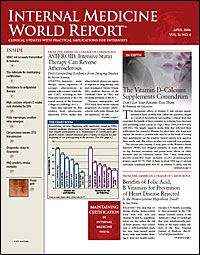Publication
Article
Internal Medicine World Report
Moderate Weight Loss Helps Alleviate Arthritis Pain
Author(s):
SAN DIEGO—Physicians now have strong new evidence to support the ?concept that losing weight helps reduce pain and stiffness in patients with ?mild-to-moderate knee osteoarthritis (OA). Even modest weight loss in obese individuals may be associated with ?nearly a 50% improvement in symptoms, according to data presented at the annual meeting of the American College of Rheumatology. The evidence comes from a study that drew much attention and commentary at the meeting.
Lead investigator Susan Bartlett, PhD, of Johns Hopkins University, Baltimore, Md, and colleagues demonstrated that losing approximately 15 lb, regardless of initial body weight, could make a significant difference in pain, stiffness, and function among patients with diagnosed knee OA.
“We have always viewed weight loss as a promising intervention for those with knee osteoarthritis, but it was unclear how much weight people needed to lose to improve their symptoms,” said Dr Bartlett. “Our data suggest that, as with other major health condi?tions...the combination of losing a few pounds and exercising more regularly can translate into ?substantial improvements. The improvements we observed with a 15-lb weight loss, even in obese persons, were significantly greater than those achieved with prescribed or over-the-counter arthritis medicines.”
Dr Bartlett said physicians now have evidence that exercise and weight loss may be viable alternatives to daily nonsteroidal antiinflammatory drug therapy and other medications for knee OA. Weight loss is often associated with other health benefits, and, unlike drug therapy, patients do not need to be monitored carefully over time.
This randomized study, which included 48 overweight and/or obese adults (81% women; mean age, 57 years) with ?mild-to-moderate knee OA, involved a 4-month weight-loss program designed to help individuals lose 1 to 2 lb weekly. All the participants had physician-diagnosed knee OA and reported having pain on Ž50% of the days of each month in 1 or both knees. They also had difficulty with activities of daily living, such as driving, climbing stairs, or getting in and out of bed.
Over the course of 4 months, the patients met weekly in small groups to discuss nutrition, physical activity, behaviors, and attitudes. A lifestyle walking program was integrated into the program, and by the second month participants were accumulating Ž30 minutes of moderate-intensity walking (about 10,000 steps) on most days of the week.
“Losing just 15 lb appears nearly twice as effective at reducing pain and stiffness as taking acetaminophen or prescription arthritis drugs such as celecoxib [Celebrex], even when taking those medications at the maximum doses recommended,” Dr Bartlett told IMWR. “Until now, both patients and physicians commonly thought a substantial weight loss [30 lb] would be required to improve symp?toms in obese patients. We were struck by how quickly people with knee OA can experience significant relief with just a small amount of effort and in a short period of time.”
Winfred Graninger, MD, of the University of Graz, Graz, Austria, said these findings were surprising; however, he said it would be hard to convince patients that weight loss may be better for their OA symptoms than medications. “It is good that it has been proven. If you lose weight you have less weight on your joints, and you feel better,” he said. “It is going to be a hard sell though. Plenty of people prefer to take a pill.”
Not all physicians agree with Dr Graninger. Some said because the benefits can be realized within a matter of weeks or months more patients might be willing to take this approach.
Eric Matteson, MD, of the Mayo Clinic in Rochester, Minn, also commented on this study. “We needed this study, because it is difficult to convince people to lose weight. This study shows that it is not a long-term benefit but a here-and-now improvement you will get in your joints, and that is an ?important message, and one that we needed,” he said. “This new information will hopefully be motivating.”





